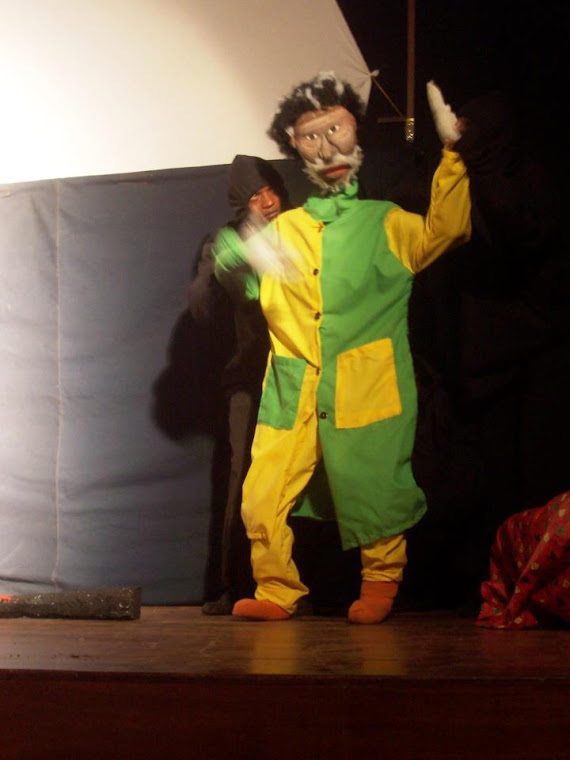Puppets in the Classroom - By Tony Mboyo, UNIMA Kenya
In 1993, FPPS, through its affiliate Programme CHAPS, developed an expanding and deepening puppetry programme in Kenya. Puppetry art has been used as means of communication for awareness creation, community mobilization and sensitization in Kenya and the African region. The metamorphosis of this art form has sprouted into dissimilar dimensions of using puppetry. To mention but a few examples, puppets have, and continue to be used, to fight corruption, to encourage gender equity, to promote Road safety, to confront HIV/AIDS, to kick polio, to ridicule, to stimulate and even just to entertain for arts sake.
Of particular interest is the more recent introduction of puppetry in the classroom, a school based initiative that promotes its use as a teaching tool.
Picture this,
“The smartly dressed social studies teacher is carefully arranging objects on the class’ working table; she places a window-shaped cardboard box, a flower vase with brightly coloured flowers, a miniature ladder, an eggshell, a flashlight and a portable music player. The pupils are in an unusual silence, the suspense is evident. She switches on the player and a soft mellow tune fills the air while, almost simultaneously, a small puppet character appears on the cardboard window singing along. It is only then that everybody realises that its time for Puppets in the Classroom! The social studies teacher has planned to use puppets to discuss ethics.”
As a preliminary point, 48 teachers from both government and private school in and around Nairobi were invited to participate in a 5-day intensive training on the use of Puppetry in a school setup. The teachers, mostly from Kindergarten and primary level who largely had no previous experience in puppetry went through the processes of design and construction, use of local material and discards, manipulation, story creation, lesson planning and finally performing with puppets.
After the workshop, the teachers continue to utilise the art form in various aspect of their teaching processes. One notable example is the use of puppetry to improve the students masterly of language and the arts. In practice, the teachers use puppets interactively with the pupils to intensify the children’s learning abilities through stories.
Schools that have been highly successful in the application of this tool include Treeside School for the Mentally Handicapped, Makini Schools, AMICUS, Lily of the Valley and Marion Preparatory School all in Nairobi, Kenya. Teachers in these schools have noted a high interest in subject that they teach using this methodology and marked enhancement in concentration during lessons
FPPS now intends to extend the program to even more schools in, and around Nairobi, with particular emphasis on the use of puppetry to promote the teaching of ethics, civics social behaviour and morals to pupils. Other needs to be met by through the project are; stimulating and improving learning for children with difficulties such as low interest and concentration, mentally challenged, hearing disabilities and other deficiencies. The project will also aim at enhancing children’s imagination, creativity and use of cultural legends and stories.
New schools, which will be integrated into the programme, have already been identified and contacted. Part of the programmes outputs will be a school’s puppetry curriculum that will be developed in collaboration with the partners from the Kenya Institute of Education (KIE), the Ministry of education and the Kenya Institute of Special education (KISE)
The projects long-term goal is to establish puppetry as an innovative, a creative and effective medium to be introduced into the curriculum of Kenyan Schools; as a tool for Kenyan teachers. It is expected that a classroom learning session will eventually be a more real, concrete and interesting experience for pupils and students.
For more info on this project contact
Anthony Mboyo
Program officer FPPS (CHAPS)
Treasurer UNIMA Kenya
P.O.Box 46042, 00100 Nairobi, Kenya
Tel (254 20) 2715002/2710705
Fax (254 20) 2715115
Email mkasmall@yahoo.com
Unima_kenya@myway.com

No comments:
Post a Comment